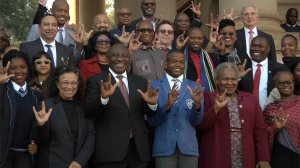President Cyril Ramaphosa said the signing of the South African Sign Language Bill as the twelfth official language is a real milestone in the country’s democracy.
In May, the National Assembly voted that the Constitution be amended to include South African Sign Language as an official language to promote the rights of persons who are deaf and hard of hearing.
“Our Constitution calls on the State to take practical and positive measures to elevate the status and advance the use of the indigenous languages for the people of South Africa. It further notes that all official languages must enjoy parity and esteem and must be treated equitably. We are also giving effect to the provision of the Bill of Rights that prohibits unfair discrimination on grounds such as disability, culture, race and gender,” said Ramaphosa.
He said South African Sign Language had served as an essential communication tool for citizens living with disability and emphasised that this step would further empower that community.
He said South Africa joined three countries on the continent in officiating sign language.
“I am rather glad that this time around as we were consulting on the Constitution. There were no disputes and disagreements about the language. I often take people back into history and say as we were negotiating our Constitution in 1996, there were a number of issues that became major disputes,” he recalled.
He said language, education and the right to strike were among the issues that caused disagreements.
He apologised that it had taken many years to reach this milestone for South African Sign Language.
He said having sign language recognised would address challenges such as economic opportunities, access to education and other social opportunities, as well as public participation.
The official recognition was just the beginning, he said.
A comprehensive electronic dictionary had already been developed.
Ramaphosa announced that the process to institutionalise sign language had already begun and he noted that specialised schools for the deaf would have to be increased in the country.
He said it was crucial that more sign language interpreters were available to assist impaired South Africans, particularly at police stations.
He congratulated all stakeholders who had worked to see this milestone come to fruition.
“Today is a great day,” said Ramaphosa.
South African National Deaf Association CEO Jabulani Blose agreed with Ramaphosa and added that a new deaf person would now be born to a South Africa that was enabling and socially just.
He recognised the leaders who began the process to see the milestone realised and he called it an historic moment.
“Thank you to the people who started this journey. This occasion is their recognition,” said Blose.
EMAIL THIS ARTICLE SAVE THIS ARTICLE ARTICLE ENQUIRY
To subscribe email subscriptions@creamermedia.co.za or click here
To advertise email advertising@creamermedia.co.za or click here










